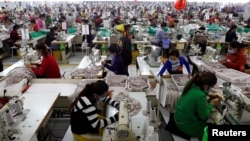The World Bank on Tuesday released a job quality report pointing to small improvements in the diversity of jobs available in Cambodia, including better paying jobs, but found that a majority of the jobs were still low on productivity and needed reforms to address future economic challenges.
The report, titled “Cambodia’s Future Jobs: Linking To The Economy Of Tomorrow”, found than around a third of jobs were salaried, offering Cambodians higher earnings and worker protections.
However, the remaining jobs were more traditional, such as household enterprises and family farm jobs, affording fluctuating wages and no worker safety nets. Also, the traditional jobs were weakly integrated into the economy.
“The diversity and quality of jobs in Cambodia has gradually improved,” said Inguna Dobraja, the World Bank’s country manager for Cambodia.
“But global trends, such as the growing Asian middle class, shifting trade patterns, and automation require that Cambodia re-think its jobs strategy as it advances to the next stage of export-led development.”
The report states that foreign firms were providing significantly more wage jobs, despite locally-owned firms far outnumbering foreign companies. The report showed that 80 percent of Cambodian adults above the age of 15 were working in contrast to 62.5 percent of adults in the East Asia Pacific region.
However, there were concerns about low productivity in the job sector, which brought down job quality overall, has long been a concern in the garment sector which employs around one million people.
The report warns that failure to scale up to value-added production would make Cambodian jobs especially susceptible to automation and deprive workers the opportunities of future global markets.
It recommends further diversification of the available jobs, by attracting higher-value foreign direct investment, ensuring that small medium enterprises are supply exporting factories and increasing capacity for small, household enterprises.
Tun Sophorn, coordinator for the International Labor Organization in Cambodia, said worker conditions were improving and that government needed to improve job quality in both the formal and informal sectors.
“When young people can find the job and work on the right skills, then they can increase our national productivity and competitiveness in all areas,” he said.
VOA Khmer could not reach Labour Ministry spokesperson Heng Sour for comment.
Yang Sophorn, head of Coalition of Cambodia Trade Unions, said workers in the garment sector were still having to deal with substandard work conditions.
“Some workers are working overtime and wages are not matching what they should get legally. It means there is still limited improvement,” Yang Sophorn said.




